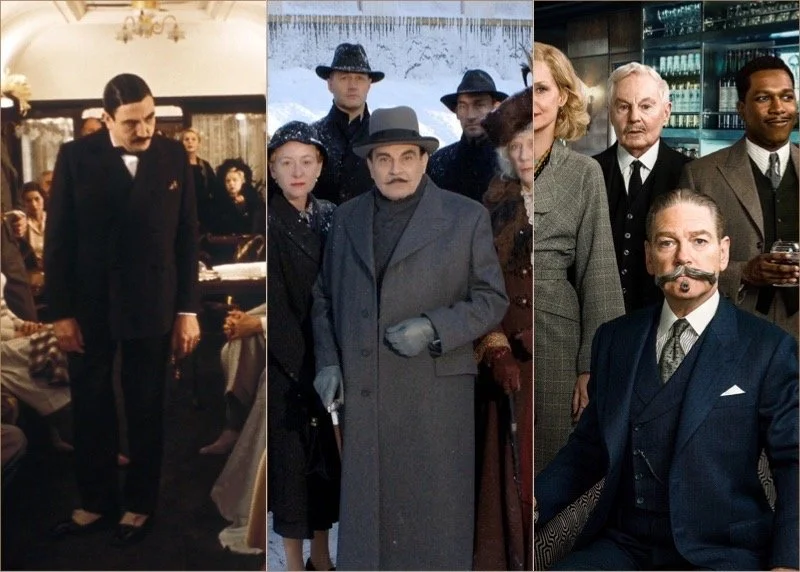Ep. 16 - Mystery’s Moral Compass in MURDER ON THE ORIENT EXPRESS
MURDER ON THE ORIENT EXPRESS - Left, Albert Finney (1974) as Hercule Poirot; Center, David Suchet (2010); Kenneth Branagh (2017)
It’s been said that murder mysteries satisfy our need to feel that there is justice in the world and a moral order, which is expressed in the character of Agatha Christie’s genius detective Hercule Poirot. But does solving the murder really close the case, especially for Poirot’s conscience?
In episode 16 Michon and Taquiena (aka The Boston Sisters) talk about three film/tv movie adaptations of Agatha Christie’s 1934 novel MURDER ON THE ORIENT EXPRESS:
The 1974 film, MURDER ON THE ORIENT EXPRESS (directed by Sidney Lumet) as a story of revenge and vigilante justice.
The 2010 film (for the Poirot television series directed by Philip Martin), a story of a murder perpetrated by persons who feel that the rule of law and even God have failed to deliver justice.
Kenneth Branagh’s 2017 film where Hercule Poirot describes the crime of murder as an act carried out by “wounded souls,” and concludes that the scales of justice cannot always be evenly weighed.
Spoiler Alert (ep 16) if you haven’t seen any of these films or read the book.
Synopsis: When his transcontinental luxury train is stranded by deep snow, detective Hercule Poirot is called on to solve a murder that occurred in his car the night before, with a multitude of suspects. (source IMDb)
CASTS OF MURDER ON THE ORIENT EXPRESS









Clips and Trailers
Murder on the Orient Express (1974) directed by Sidney Lumet
Murder on the Orient Express (2010 Poirot series) directed by Philip Martin
Murder on the Orient Express (2017) directed by Kenneth Branagh
Take a Deeper Dive
Agatha Christie official website
FBI History/Famous Cases - Agatha Christie based the book’s backstory (Armstrong kidnapping/murder) on the real-life 1932 kidnapping and murder of 20-month-year-old Charles Lindbergh, Jr., son of Anne and Charles Lindbergh. Visit the FBI’s history of famous cases.
History of the Orient Express train - Smithsonian Magazine
The three MURDER ON THE ORIENT EXPRESS films mentioned in this podcast are available for streaming (rent or purchase). For streaming options search on justwatch.com. Also check your local library for availability on DVD.



